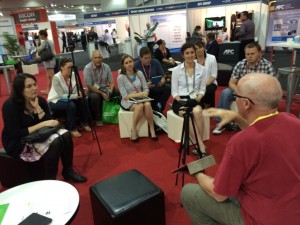Four years ago this month, my wife and I purchased a house in Australia’s iconic Barossa Valley. For the overseas, uninitiated reader, the Barossa is unquestionably the nation’s best known wine producing region. We were attracted to the idyllic scenery, the wine (well, of course) and most especially the small historic town of Angaston; population 1909. (Or maybe it’s now 1911.)
As much as we were keen to take up immediate residence, we had to wait for our two children to …
- Finish their schooling or
- Leave home or
- Be kidnapped (think Liam Neeson in Taken, but without the rescue) or
- Be imprisoned
Thankfully, our daughter is now pursuing a career in theatre (she was always a Drama Queen) whilst our son has a girlfriend (he doesn’t know how!) and has completed an engineering degree (we don’t know how!)
Not long after we purchased our house, the very first iPad appeared and my career as an educator underwent an unexpected transformation. At 55 years of age with 33 years in the classroom behind me, I am an unlikely iPad Ed Evangelist. (Thanks Branchfire for labelling me as such, I do like a title.) Earlier this year when I announced on Twitter that we would be moving to the Barossa I was pleased though not surprised by the assistance I received. My South Australian tweeps were quick to offer advice, links to job websites and even the offer of a “Welcome Reception.”
The process to register as a teacher in South Australia was reasonably straight forward and indeed my biggest concern … “Who’s going to employ someone who is 55?” A colleague in the Barossa advised me, via Twitter, that a position would be available at his state high school in 2015. I firmly believe that I was given an interview because I was a “known figure” on Twitter. I’ve invested many, many (my wife would say too many) hours in Twitter. Over the past two and a half years I’ve amassed in excess of 2500 followers; all of them a part of the educational sphere. This has led to me being offered the opportunity to present at conferences and to write for more than one magazine. I was honestly “blown away” to be offered the job; especially after more than 25 years in Catholic education. Yet, astonishingly, within the next half an hour, I was offered interviews at two further schools. (Way to confuse a man and simultaneously boost his already hugely over-inflated ego!)
I declined one of these offers on the simple basis of distance; I didn’t want a 100 kilometre round trip each day. The other I gladly accepted. When I arrived at that interview, I recognised the Acting Principal and the panel chair as another member of my PLN. The interview was certainly exhaustive at nearly one and a half hours but it was a great experience to talk with like-minded individuals who share my EdTech enthusiasm. Later that same day I was offered and accepted the position for 2015 and 2016. I was flattered to be told, “we were so excited when your application came in. We recognised you.” Within hours, several members of the staff had followed me on Twitter after hearing of the appointment.
So, thank you Twitter. Thanks to being a self-professed “big deal” on a social media network, I will be assuming the newly created position of eLearning Manager at Faith Lutheran College in Tanunda. My only genuine concern now is if I will be able to live up to the Twype (it’s my new word for Twitter Hype!) in the real world of a new school.
PS: Damn and blast … Twype is already in the Urban Dictionary to describe the “excessive hype built up around the Twilight saga.” Well, that’s done now, Edward creeped me out and Bella was so “wet!” They don’t need the word anymore, so it’s mine.















